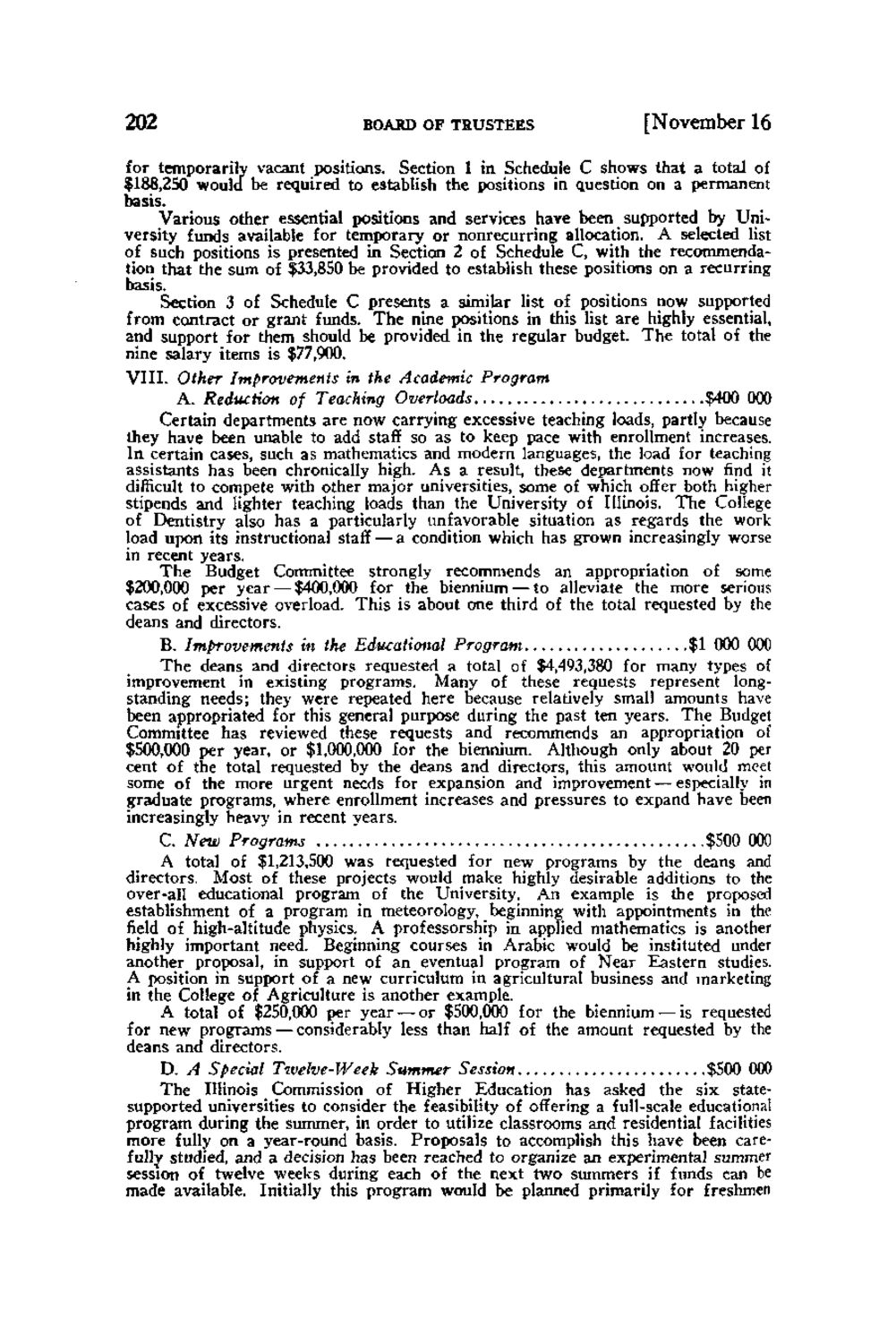| |
| |
Caption: Board of Trustees Minutes - 1962
This is a reduced-resolution page image for fast online browsing.

EXTRACTED TEXT FROM PAGE:
202 BOARD OF TRUSTEES [November 16 for temporarily vacant positions. Section 1 m Schedule C shows that a total of $186,250 would be required to establish the positions in question on a permanent basis. Various other essential positions and services have been supported by University funds available for temporary or nonrecurring allocation. A selecled list of such positions is presented in Section 2 of Schedule C, with the recommendation that the sum of $33,850 be provided to establish these positions on a recurring basis. Section 3 of Schedule C presents a similar list of positions now supported from contract or grant funds. The nine positions in this list are highly essential, and support for them should be provided in the regular budget. The total of the nine salary items is $77,900, VIII. Other Improvements in the Academic Program A. Reduction of Teaching Overloads $400 000 Certain departments are now carrying excessive teaching loads, partly because Ihey have been unable to add staff so as to keep pace with enrollment increases. In certain cases, such as mathematics and modern languages, the load for teaching assistants has been chronically high. As a result, these departments now find it difficult to compete with other major universities, some of which offer both higher stipends and lighter teaching loads than the University of Illinois. The College of Dentistry also has a particularly unfavorable situation as regards the work load upon its instructional staff — a condition which has grown increasingly worse in recent years. The Budget Committee strongly recommends an appropriation of some $200,000 per year — $400,000 for the biennium — to alleviate the more serious cases of excessive overload. This is about one third of the total requested by the deans and directors. B. Improvements in the Educational Program $1 000 000 The deans and directors requested a total of $4,493,380 for many types of improvement in existing programs. Many of these requests represent longstanding needs; they were repeated here because relatively small amounts have been appropriated for this general purpose during the past ten years. The Budget Committee has reviewed these requests and recommends an appropriation of $500,000 per year, or $1,000,000 for the biennium. Although only about 20 per cent of the total requested by the deans and directors, this amount would meet some of the more urgent needs for expansion and improvement —especially in graduate programs, where enrollment increases and pressures to expand have been increasingly heavy in recent years. C. New Programs $500 000 A total of $1,213,500 was requested for new programs by the deans and directors. Most of these projects would make highly desirable additions to the over-all educational program of the University. An example is the proposed establishment of a program in meteorology, beginning with appointments in the field of high-altitude physics. A professorship in applied mathematics is another highly important need. Beginning courses in Arabic would be instituted under another^ proposal, in support of an eventual program of Near Eastern studies. A position in support of a new curriculum in agricultural business and marketing in the College of Agriculture is another example. A total of $250,000 per year —or $500,000 for the biennium — is requested for new programs — considerably less than half of the amount requested by the deans and directors. D. A Special Twelve-Week Summer Session $500 000 The Illinois Commission of Higher Education has asked the six statesupported universities to consider the feasibility of offering a full-scale educations! program during the summer, in order to utilize classrooms and residential facilities more fully on a year-round basis. Proposals to accomplish this have been carefully studied, and a decision has been reached to organize an experimental summer session of twelve weeks during each of the next two summers if funds can be made available. Initially this program would be planned primarily for freshmen
| |